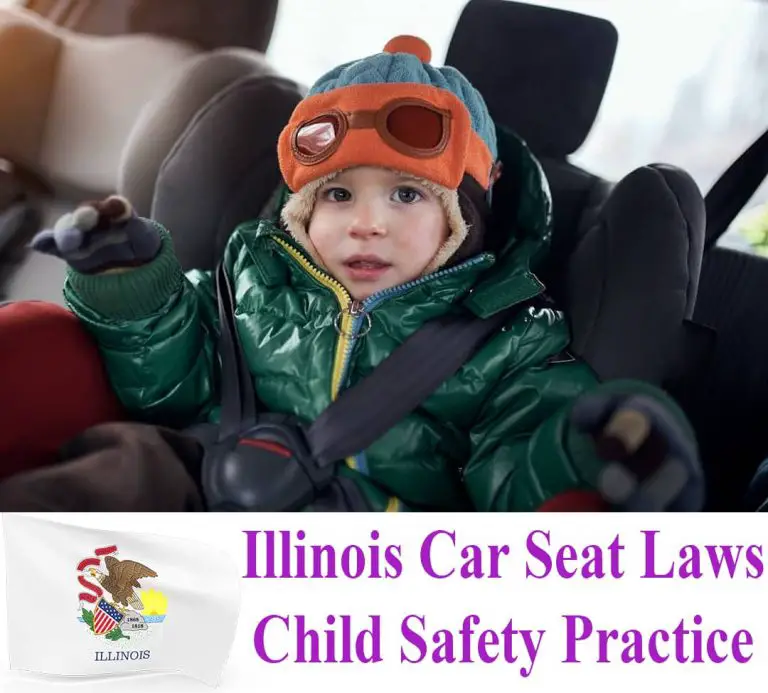Illinois Car Seat Laws - Updated & Simplified

Table of Contents
Illinois Car Seat Laws
Illinois State Car Seat Laws (IL Statutes 625 ILCS 5/12-6031 and 625 ILCS 25/6)
IL Statutes 625 ILCS 25/6 – Child Passenger Protection Act.
What do the child passenger restraint system laws in Illinois say?
- A child passenger under 8 years being transported in a ‘motor vehicle’ shall be properly secured with an appropriate child restraint system that meets federal standards.
- The parent or legal guardian of a child under 8 years shall provide the appropriate child restraint system for the child’s age to any person who transports their child.
- Infants and toddlers under 2 years of age, weighing less than 40 lbs. or 40 inches tall, shall be properly secured in a rear-facing child restraint system.
- A child weighing more than 40 lbs. may be restrained in the vehicle’s back seat in a lap and shoulder belt or a lap belt.
- A child passenger over 8 years but under 19 years of age shall be secured in a properly adjusted and fastened safety seat belt or an appropriate child restraint system.
IL Statutes 625 ILCS 5/12-6031 – Safety Belt
A driver transporting a child 8-16 years old shall secure the child in a properly adjusted and fastened safety belt.

More on the Law
- For physical or medical reasons, a child who may not be able to be properly secured by a child restraint system or a safety belt shall have a written statement from a physician.
- A back seat passenger of a taxi cab is exempted from the car seat laws.
- A violation of the Child Passenger Protect Act (Illinois Car Seat Laws) shall attract a fine of $75 on a first-time violation.
- A second or subsequent violation shall attract a fine of $200.
- A violation of the safety belt law shall be a ‘petty offense’ and attracts a fine of not more than $25.
Laws on Rear Facing
The State of Illinois requires that infants and toddlers under 2 years of age, weighing less than 40 lbs. or measuring less than 40 inches in height, be properly secured in a rear-facing car seat.
On average, a child weighing or measuring less than 40 lbs. or 40 inches respectively is under 4 years of age.
This is in line with safe practice as recommended by the American Academy of Pediatrics, which says infants under 2 years should ride in a rear-facing car seat and for as long as possible (to an upper limit of 4 years).
Laws on Forward Facing
The State of Illinois car seat laws do not mention the forward-facing car seat but mention an ‘appropriate child restraint system’ for a child passenger under 8 years.
By the types of car seats by age and recommendations of car seat manufacturers, a child who has outgrown the weight and height limit of the rear-facing car seat is to be transitioned to the forward-facing car seat.
A child is to remain in the forward-facing car seat until they outgrow the weight and height limits set by the car seat manufacturer.
A convertible car seat can be used in a rear-facing position and later converted to forward-facing. Here’s a guide on how to choose a convertible car seat.
Laws on Booster Seat
The Illinois car seat laws do not mention a booster seat but mention that an appropriate child restraint system for a child under 8 years be used.
The law also mentions that a child between 8 and 19 years be secured by a safety belt or an appropriate restraint system.
That would mean the right child restraint system as recommended by car seat manufacturers.
Car seat manufacturers recommend that when a child outgrows the forward-facing car seat, such child ride in a belt-positioning booster seat.
The booster seat is recommended for school-aged children between 8 and 12 years.
A child may continue to be secured in a booster seat until the vehicle lap and shoulder belt can fit properly on the child.
Seat Belt
The State of Illinois has two laws that indicate on the use of a seat belt;
- A child weighing more than 40 lbs. may be restrained in the vehicle’s back seat in a lap and shoulder belt or a lap belt.
- A child passenger over 8 years but under 19 years of age shall be secured in a properly adjusted and fastened safety seat belt or an appropriate child restraint system.
According to these laws, a child above 4 years (the average age of a child weighing more than 40 lbs. is 4 years) can be secured by a seat belt in Illinois and must ride in the back seat.
However, for optimal protection and as recommended by car seat manufacturers, and following national best recommendation practices, a child should use the seat belt when they are big enough for the safety belt to fit properly on them.
Usually, a child would have grown big enough for the seat belt to fit properly between 8 and 12 years.
Other Car Seat Laws You Need to Know About in Illinois
Laws for Other Passengers in a Car
All other vehicle occupants, including the driver, must use a safety seat belt.
Front Seat – Can A Child Sit in The Front Seat?
Illinois car seat laws specifically mention that a child weighing more than 40 lbs. be secured in the back seat with a seat belt.
This implies you are not advised to ride with a child in the front seat in Illinois.
To start with, a rear-facing car seat must never be installed in the front passenger seat with an activated airbag.
On the other hand, a child over 40 lbs. (at least 4 years) is to ride in the back seat using a seat belt.
That means a child cannot sit in the front seat until they reach the legal age permitted, which is 13.
By general best practice, a child under 13 years is not to ride in the front seat. A child under 13 years is to ride in the back seat with the seat belt fastened correctly or in a child restraint system.
Ubers, Taxis, or Cabs
The State of Illinois does not exclusively exempt taxicabs from the Child Passenger Protection Act but from the safety belt law.
“(b) Paragraph (a) shall not apply to any of the following; -: 11. A back seat passenger of a taxicab.”
On the other hand, the Act says,
“The parent or legal guardian of a child under 8 years shall provide a child restraint system to any person who transports their child.”
Therefore, you are to ensure you secure your child in a car seat in a taxi, Uber, or Cab when in Illinois.
When boarding a taxi or Uber, you may need to install your infant car seat without the base. This resource will guide you in installing a child car seat without the base.
Can You Leave a Child Alone in a Vehicle in Illinois?
The State of Illinois does not permit leaving a child unattended in a vehicle.
According to the Illinois Department of Children & Family Services it is unlawful to leave a child under 6 years in a car unattended for more than 10 minutes.
By “unattended,” the Department means not accompanied by a person at least 14 years old.
A violation of this law on the first attempt is a Class A misdemeanor. A second or subsequent violation is a Class 3 felony.
A Class A misdemeanor in Illinois carries penalties that include up to 364 days jail term and a fine of $75, up to $2,500.
A Class 3 felony in Illinois carries penalties that include a prison sentence of not less than 2 years and not more than 5 years, and for extended term, a prison sentence of not less than 5 years and not more than 10 years.
If the violation of this law leads to the death of the child, it becomes a Class 3 felony that, if sentenced to imprisonment, shall serve not less than 2 years.
You should therefore ensure not to leave your child alone in the vehicle.
Smoking Around Children in a Car in Illinois – is it illegal?
It is illegal to smoke around a child under 18 years in a motor vehicle in Illinois. The law prohibits smoking in a car around a minor irrespective of the vehicle’s motion or if the windows are opened.
A first-time violation of the law is regarded as a petty offense and is punishable by a fine of not more than $250. On second or subsequent violation, a fine of not more than $250 is applicable.
On the other hand, you need to understand why smoking around a child is unhealthy for them.
Secondhand smoke is not safe for a child’s health. It exposes them to many health risks, including severe asthma attacks, bronchitis, pneumonia, respiratory infections, ear infections, and sudden infant death syndrome (SIDS).

